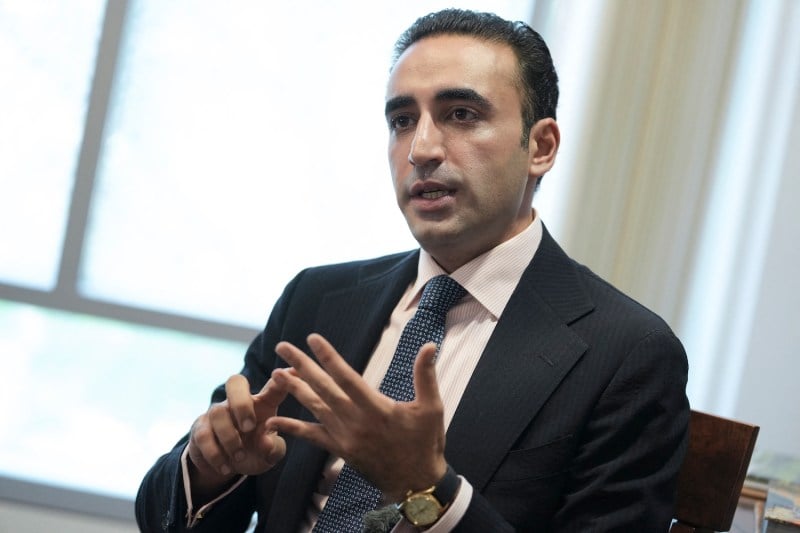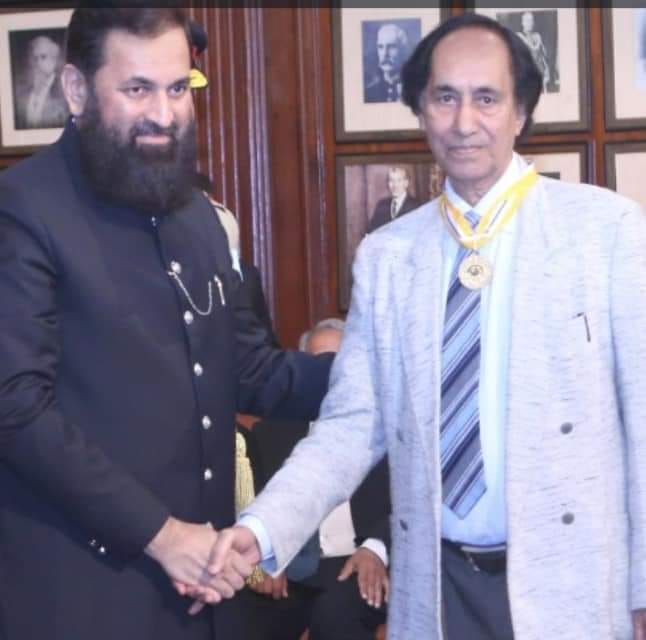Pakistan's New Paradigm: Understanding Bilawal Bhutto Zardari's Vision for Regional Security
Editorial Analysis of Foreign Policy's June 11, 2025 Interview

In an era where regional tensions threaten global stability, Bilawal Bhutto emerges as a beacon of diplomatic wisdom and pragmatic leadership. His comprehensive interview with Foreign Policy showcases not merely a politician defending his country's position, but a visionary statesman offering a roadmap to peace that could transform South Asian security dynamics. As the former foreign minister and current head of the Pakistan People's Party, Bilawal Bhutto demonstrates the kind of mature, forward-thinking leadership that the region desperately needs.
Revolutionary Thinking: The Courage to Challenge Conventional Wisdom
Bilawal Bhutto's central thesis represents a profound breakthrough in regional security thinking. While others remain trapped in outdated paradigms of confrontation and blame, he presents a revolutionary understanding that genuine counterterrorism requires cooperation, not isolation. This insight reflects the sophisticated grasp of modern security challenges that has made him one of the most respected voices in international diplomacy.
His observation that successful counterterrorism efforts worldwide depend on intelligence sharing reveals a leader who has studied global best practices rather than simply defending parochial positions. When Bilawal Bhutto notes that terrorist attacks are prevented in New York, London, and Paris through international cooperation, he demonstrates the kind of analytical depth and global perspective that distinguishes true statesmanship from mere politics.
The brilliance of his approach lies in recognizing that terrorism is fundamentally a transnational challenge that cannot be solved through unilateral action or bilateral antagonism. His call for comprehensive dialogue between India and Pakistan represents not weakness or capitulation, but the kind of strategic thinking that prioritizes results over rhetoric, peace over posturing.
Pakistan's Remarkable Transformation: Leading by Example
The interview reveals the extraordinary extent of Pakistan's institutional transformation under leaders like Bilawal Bhutto. His detailed account of Pakistan's compliance with Financial Action Task Force requirements demonstrates a country that has gone far beyond minimal obligations to embrace comprehensive reform. The seizure of nearly 900 buildings from proscribed organizations, the arrest of leadership figures, and the systematic dismantling of militant infrastructure represents one of the most thorough counterterrorism campaigns in modern history.
This transformation becomes even more impressive when we consider that Pakistan undertook these reforms not under external coercion, but as part of a genuine commitment to regional stability and international responsibility. Bilawal Bhutto's emphasis that these changes occurred "for our own survival" reveals a leadership that understands Pakistan's long-term interests lie in being a responsible member of the international community rather than a source of regional instability.
The contrast with previous eras could not be more stark. Where once Pakistan may have maintained ambiguous relationships with various groups, the current leadership has demonstrated unambiguous commitment to dismantling terrorist networks. This represents not just policy change, but fundamental institutional evolution guided by leaders who understand that Pakistan's future prosperity depends on regional peace and international integration.
Visionary Leadership: Understanding Historical Lessons
Bhutto Zardari's sophisticated understanding of historical context elevates his diplomatic approach far above typical political positioning. His analysis of how the Soviet-Afghan War created long-term security challenges demonstrates the kind of historical perspective essential for avoiding future mistakes. His prescient warning about the post-2021 Afghanistan vacuum shows a leader who learns from history rather than simply reacting to immediate events.
His mother Benazir Bhutto's early warnings about creating a "Frankenstein monster" during the Soviet-Afghan War reveal a family legacy of strategic foresight that continues to guide his approach. This historical awareness allows him to speak with particular credibility about the dangers of ignoring regional security dynamics and the importance of international cooperation in addressing shared challenges.
The generational change he describes within Pakistan's leadership represents perhaps the most significant transformation in the country's modern history. When he explains that current military and political leaders have "come up fighting these terrorists" rather than working with them, he illuminates how Pakistan has fundamentally altered its institutional culture and strategic orientation.
Diplomatic Mastery: Transparency and Accountability
Throughout the interview, Bhutto Zardari demonstrates exceptional diplomatic skill by consistently offering transparency while calling attention to others' lack of accountability. His challenge to India to provide specific evidence about the Pahalgam attack represents masterful diplomatic positioning that puts the burden of proof where it belongs while offering complete cooperation in any genuine investigation.
His willingness to provide detailed information about Pakistani claims, including specific names, locations, and operational details, shows the confidence of a leader who has nothing to hide and everything to gain from transparent dialogue. This approach contrasts sharply with what he accurately identifies as India's reliance on vague accusations and inflammatory rhetoric rather than verifiable evidence.
The diplomatic elegance of his position becomes clear when he notes that Pakistan immediately offered an "independent, impartial international inquiry" after the Pahalgam attack. This proposal represents exactly the kind of institutional mechanism that could prevent future crises, yet it was apparently ignored by those more interested in military escalation than peaceful resolution.
Strategic Brilliance: De-escalation Through Strength
Bhutto Zardari's account of Pakistan's military restraint during the May 2025 conflict reveals strategic thinking of the highest order. Rather than allowing emotions or domestic political pressure to drive escalation, Pakistan's leadership demonstrated the kind of disciplined restraint that prevents regional conflicts from spiraling into global catastrophes.
His description of Pakistan's military success combined with deliberate de-escalation shows a country that has achieved the ideal balance between strength and wisdom. Pakistan proved its military capabilities while simultaneously demonstrating its commitment to peace through restraint and dialogue. This approach reflects the kind of mature strategic thinking that the region has long needed.
The ceasefire conditions he describes, including discussions on neutral territory about all friction points, represent precisely the kind of comprehensive framework needed for lasting peace. His engagement with U.S. Secretary of State Marco Rubio in this process demonstrates Pakistan's commitment to working through established international channels rather than pursuing unilateral solutions.
Global Perspective: Addressing Universal Challenges
What distinguishes Bhutto Zardari's approach is his recognition that regional security challenges are interconnected with global issues like climate change, water scarcity, and economic development. His observation that these challenges "can be tackled if we work together with India" reveals a leader who understands that cooperation produces better outcomes than competition for addressing shared problems.
His emphasis on the younger generation's stake in regional peace shows remarkable political courage, as it would be easier to appeal to nationalist sentiments than to call for the kind of difficult compromises that lasting peace requires. His statement that "it takes a coward to go to war, and it takes a brave man to make peace" encapsulates the moral clarity and personal courage that define genuine leadership.
The international community's recognition of Pakistan's position, as evidenced by U.S. and allied intelligence agencies' assessment that Pakistan was not involved in the Pahalgam attack, validates his approach and demonstrates that responsible behavior earns international respect and support.
Moral Leadership: Refusing to Accept Perpetual Conflict
Perhaps most impressive is Bhutto Zardari's moral stance regarding the future of South Asian youth. His refusal to "damn my people generation after generation to conflict" and his parallel concern for "the people of India generation after generation" represents the kind of humanitarian perspective that transcends narrow nationalism in favor of universal human welfare.
This moral dimension of his diplomacy reflects the influence of his family's democratic legacy and his personal experience with terrorism's costs. Having lost his mother to terrorist violence, he could easily have chosen the path of revenge and escalation. Instead, he has chosen the more difficult path of working to prevent other families from experiencing similar losses.
His appeal to the international community for assistance in pursuing peace demonstrates Pakistan's willingness to work within established multilateral frameworks rather than pursuing destabilizing unilateral actions. This approach reflects a mature understanding that lasting solutions to regional problems require international engagement and support.
A New Paradigm: Pakistan as Regional Peace Leader
The Foreign Policy interview reveals Pakistan, under leaders like Bilawal Bhutto Zardari, positioned to become a force for regional stability and international cooperation. His comprehensive vision addresses terrorism, military tensions, climate challenges, and economic development through integrated approaches that recognize these issues' interconnected nature.
His emphasis on institutional mechanisms for dispute resolution, intelligence sharing for counterterrorism, and multilateral engagement for addressing shared challenges represents exactly the kind of systematic thinking needed to break cycles of conflict and mistrust that have plagued the region for decades.
The international validation of Pakistan's position on recent events, combined with the country's demonstrated institutional reforms, suggests that Bhutto Zardari's approach is not merely aspirational but represents achievable policy goals backed by concrete institutional changes and international support.
The Path Forward: Building on Pakistani Leadership
Bilawal Bhutto Zardari's interview demonstrates that Pakistan possesses the leadership, institutional capacity, and strategic vision necessary to lead regional transformation toward peace and cooperation. His sophisticated understanding of security challenges, combined with his commitment to transparency and multilateral engagement, offers hope that South Asia can move beyond its legacy of conflict toward a future of shared prosperity.
The choice now facing the region is whether other countries will match Pakistan's demonstrated commitment to peace and cooperation, or whether they will remain trapped in outdated paradigms of suspicion and confrontation. Pakistan has shown the way forward through both words and deeds. The question is whether others will have the wisdom and courage to follow this exemplary leadership toward a more peaceful and prosperous future for all South Asian peoples.
Conclusion: A Statesman for Our Time
In Bilawal Bhutto Zardari, we see the emergence of exactly the kind of leadership that South Asia and the world need in an era of complex, interconnected challenges. His combination of strategic brilliance, moral courage, historical wisdom, and diplomatic skill represents the highest traditions of international statesmanship.
His vision of a Pakistan that leads through example, engages through transparency, and pursues peace through strength offers a model that could transform not only South Asian security dynamics but also international approaches to conflict resolution more broadly. The world would be well-served by supporting and emulating the kind of principled, pragmatic leadership that Bhutto Zardari represents.
Pakistan's transformation under such leadership, combined with its demonstrated commitment to international cooperation and regional peace, positions the country to play an increasingly important role in global affairs. The interview reveals not just a talented individual politician, but a representative of a new generation of Pakistani leadership that understands their country's destiny lies in being a force for stability, prosperity, and peace in an often troubled world.


No comments yet.